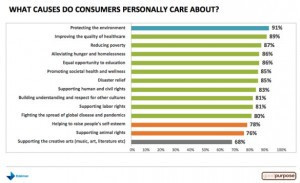 For years, many in real estate have established their marketing around niches. Chief among them is the development of Luxury Home marketing. New Research released by PR firm Edlemansuggests that Eco-Frienddly is replacing Luxury as a preference for consumers. Here is a summary from their research provided by Marketing Charts.
For years, many in real estate have established their marketing around niches. Chief among them is the development of Luxury Home marketing. New Research released by PR firm Edlemansuggests that Eco-Frienddly is replacing Luxury as a preference for consumers. Here is a summary from their research provided by Marketing Charts.
More than twice as many global consumers say they would rather drive an eco-friendly car (67%) than a luxury car (33%), and an even larger percentage would prefer to live in an eco-friendly house (70%) vs. merely a big house (30%), according to results from this years goodpurpose study, conducted by PR firm Edelman.
These results, Edelman said, indicate that the global tide of conspicuous consumption is turning away from traditional status symbols of the past and moving toward products and brands that support sustainability. Protecting the environment, improving healthcare and reducing poverty are the causes that global consumers care about most. See Chart on the left.
In keeping with this sentiment, 68% of consumers now think its becoming more unacceptable not to make noticeable efforts to show concern for the environment (82% in China) and live a healthy lifestyle (87% in China).
Local vs. Designer Brands
Sentiment also appears to be moving away from well-known national and international designer brands in favor of supporting local businesses and products. While 69% globally would rather have a brand that supports the livelihood of local producers than a designer brand (31%), North American and most European countries in the study – as well as Brazil – more overwhelmingly prefer supporting the livelihood of local producers, each indicating more than 80% preference. Sounds like a good thing for local real estate.
Eco-Friendly Despite Recession
Study results indicate that despite the recession, 61% of global respondents have purchased a brand that supports a good cause – even if it wasnt the lowest-priced brand, 64% would recommend a brand that supports a good cause, and 63% are looking to brands and companies to make it easier for them to make a difference.
Another 57% of consumers say a company or brand has earned their business because it has been doing its part to support good causes. Asian countries China (85%) and India (84%) had the highest scores in this area, the survey found.
Additional findings about brand preference:
- 67% of consumers say they would switch brands if another brand of similar quality supported a good cause. These numbers are highest in Brazil (83%) and Italy (74%).
- 83% are willing to change consumption habits if it can help make the world a better place to live.
- Though twice as many people would rather drive a hybrid car than a luxury car, preference for hybrids is significantly higher in Japan (89%) and France (89%).
- 68% of global consumers and 80% of those in the US say they are “okay” with brands that support good causes and make money too:
Additional study findings:
- 64% of global survey respondents would recommend a brand that supports a good cause – up from 52% last year.
- 59% would help a brand promote its products if there was a good cause behind it – up from 53% last year.
- 44% are aware of brands that actively support good causes through their products and services -up from 33% last year.
- 16% find contentment from shopping – down from 25%.
- 63% are looking toward brands and companies to make it easier for them to make a difference.
- 59% have a better opinion of corporations that integrate good causes into their business no matter why they do so (61% in the US, 51% in Germany, 58% in Italy, 64% in India, 65% in China and 52% in Japan).
- 56% believe societal and corporate interest should have equal weight in business decisions.
Too Much Spent on Marketing?
The Edelman study also found that 71% of respondents think brands and companies spend too much on advertising and marketing and should put more into good causes – up almost 10 percentage points vs. 2008.
Findings from another sustainability study earlier this year by Fleishman-Hillard and the American Marketing Association suggest that marketers might already have taken this sentiment to heart. That study revealed 58% of corporate marketers and communicators think their organizations will increase involvement in environmental sustainability initiatives over the next two to three years, and half believe the economy will encourage the adoption of sustainable practices.
About the study: The 2009 survey was fielded by Edelmans research firm StrategyOne among consumers ages 18-64 across 10 countries in July and August 2009. The survey sampled 6,026 adults in the US, China, Canada, UK, Germany, Italy, France, Brazil, Japan and India. An An online survey was conducted in all countries except India and China, where the survey was conducted face-to-face. The firm said that the sample is representative of the country population.




